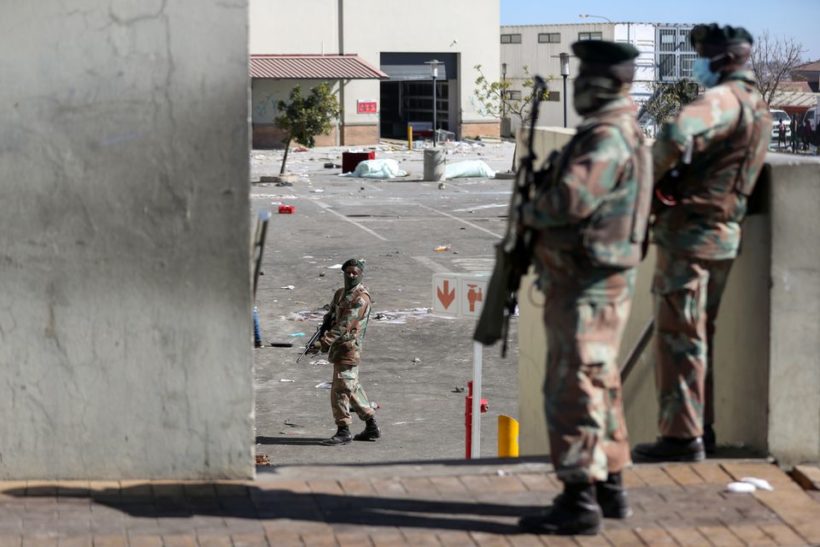
DURBAN, South Africa, July 15 (Reuters) – A week of violence, arson and looting that has engulfed South Africa slowly began to ebb on Thursday as several districts rocked by the mayhem were quiet ahead of an expected surge in soldiers on the streets.
Pockets of looting contiued in the eastern port city of Durban.
A Reuters reporter saw crowds in Durban’s Mobeni neighbourhood rollling away trolleys loaded with maize meal and other looted staples. Some loaded pick-up trucks – one such truck had to be abandoned as it had run out of fuel. Petrol stations have shut across the city because of the unrest.
Taxi drivers blockaded some roads to try to prevent further pillaging.
The riots initially started with the jailing of ex-president Jacob Zuma last week after he failed to appear at a corruption inquiry. But they swiftly degenerated into looting and destruction, driven by widespread anger over the hardship and inequality that nearly three decades of democracy since the end of apartheid have failed to address.
South Africa’s defence minister said on Wednesday he planned to deploy up to 25,000 soldiers in the two provinces where security forces are struggling to quell days of looting, arson and violence.
The soldiers were expected in the hot spots of KwaZulu-Natal and Gauteng provinces, where the police and army have been battling the disorder for days. Authorities say 5,000 troops are already on the streets since Wednesday, double the number originally planned. It was unclear when the rest would arrive.
More than 70 people have been killed in the unrest, the worst in South Africa for years, and hundreds of businesses wrecked. Security forces have arrested at least 1,350 people.
Shopping malls and warehouses have been ransacked or set ablaze in several cities, mostly in Zuma’s home in the KwaZulu-Natal province, especially Durban, and the financial and economic centre Johannesburg and surrounding Gauteng province.
In South Africa’s largest township Soweto, outside Johannesburg, streets were quiet on Thursday and shopkeepers were going through the wreckage left of their stores, a Reuters reporter said.
In Johannesburg’s central business district, and the township of Alexandra, both also hit hard by violence, the streets were calm.
(Reporting by Siyabong Sishi, Additional reporting by Nqobile Dludla and Shafiek Tassiem, Writing by Tim Cocks, Editing by Angus MacSwan)

